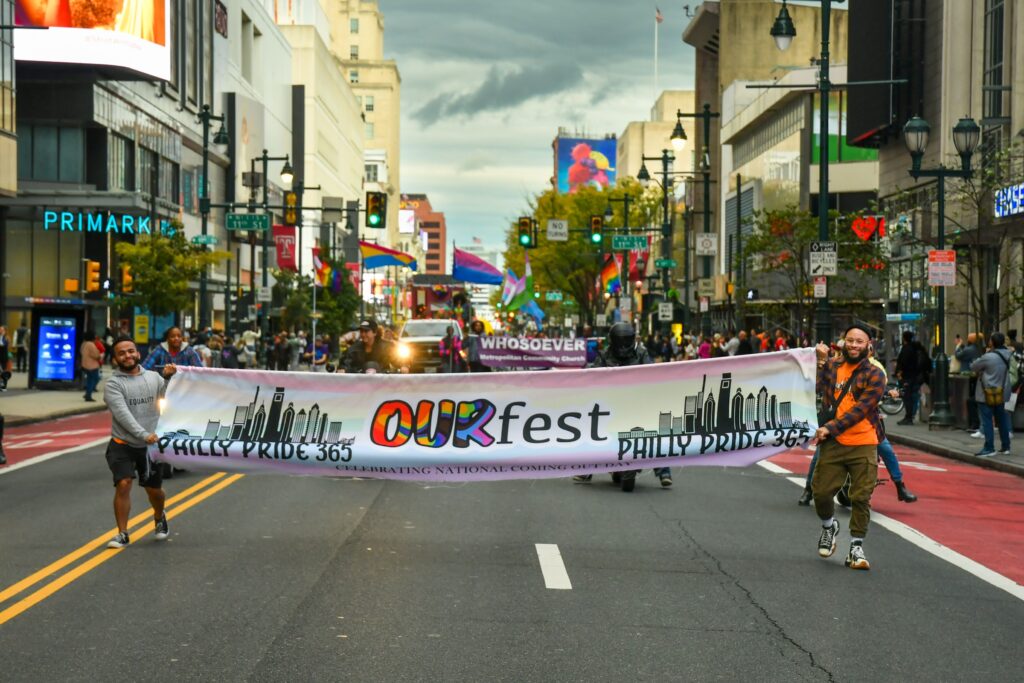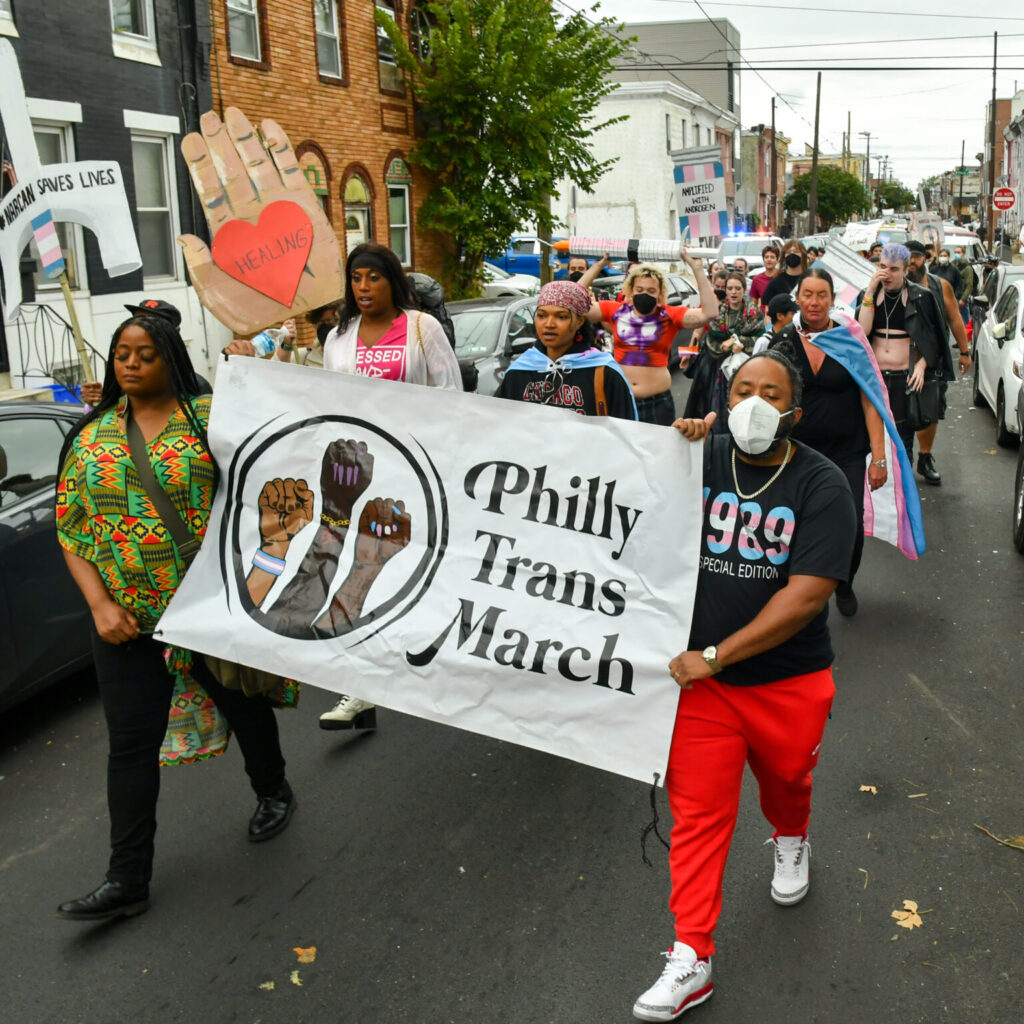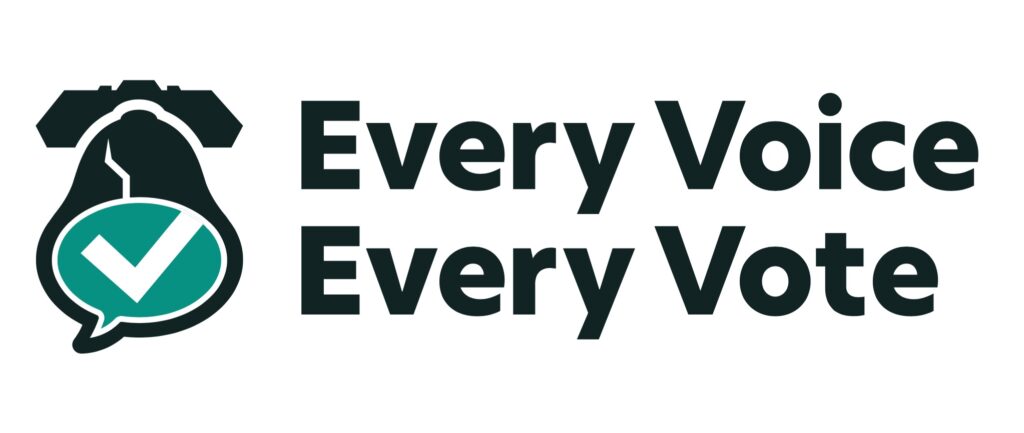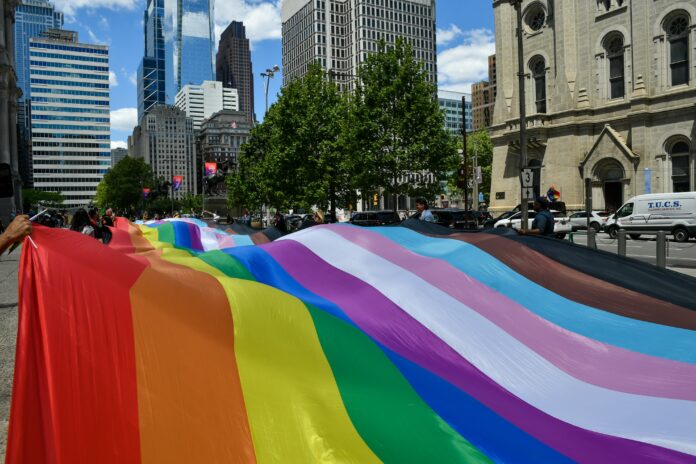Less than two weeks ago, a Philadelphia teen was arrested and charged with terrorism-related offenses. Authorities revealed that the teen had considered targeting the LGBTQ+ community and local Pride events — leaving some worried about copy-cats and about general anti-LGBTQ+ sentiment causing increased risk.
Still, many feel it’s important to be as visible as ever. National Coming Out Day is Friday, Oct. 11 — and LGBTQ+ Philadelphians are gearing up for major annual events that draw big crowds to Center City. Ahead of the holiday weekend, PGN spoke with organizers — who shared why these events are crucial and what they’re doing to make sure attendees are safe.
OURFest

“What this did prove is that the FBI and law enforcement were up to task and doing their due diligence in their job to protect our community — so that’s one thing that I feel comforted by and that people should feel comforted by in this moment,” said Tyrell Brown of Galaei, the organization behind Philly’s Pride festival and upcoming OURFest — which is returning Oct. 12-13.
OURFest will have a “beefed up” approach to security this year, Brown explained. The area will be secured before the parade and festival begins. Trash cans and other hiding places will be checked for potential dangers. Private security professionals and city police will be present. The festival and resource fair will also encourage the use of “soft entries” where bag screenings will take place.
“The priority here is that our events are safe, right?” Brown said. “The priority here is that our community gets to celebrate itself, and these institutions are preparing to make sure that we are not threatened by outside forces who are seeking to harm us.”
Brown encourages attendees not to bring large bags — including book bags and totes — and to avoid setting bags down at any point. The event is not BYO — so plan to patronize local establishments rather than bringing alcohol, which may be confiscated at screenings.
Formal exits will be implemented at the end of the festival to help people navigate the roadways as they begin to reopen. This also offers an easier way to monitor the crowds for safety reasons.
Brown noted that there’s no right or wrong way to celebrate National Coming Out Day — and that people who aren’t comfortable in crowds right now should do something else that helps them embrace their own sense of queer joy.
“We’ve earned the right to let our hair down and to dance in the face of people who are trying to take our rights away,” they said. “Joy is one of the biggest tools to fight oppression.”
Brown is also dreaming up what it might look like to celebrate queer joy throughout the year. They’re inspired by the Center City open streets initiative and would love to see something similar organized for the Gayborhood.
Although there’s some overlap in theme and activities, Brown explained that OURFest has a distinct vibe that makes it unique compared to Pride festivities.
The second annual parade is returning on Saturday, Oct. 12 from 4 to 6 p.m. Registration is still open for participants who want to march or join in with a float — but the deadline is quickly approaching. Those interested should reach out by Oct. 6. Brown underlined that costs won’t be a barrier to participation.
Onlookers can stake out a spot to watch the parade along the route, which will travel from 5th and Market to Broad and Locust.
The festival and resource fair is still looking for sponsors — which Brown described as a great way for large companies and established institutions to show their support for LGBTQ+ people. Vendors can reach new audiences by tabling at the event.
That portion of the event will run on Sunday, Oct. 13 from 12 p.m. to 7 p.m. between 12th and 13th streets and include sections of Pine, Walnut and Locust. The event will feature art and music from the community, food trucks, beer gardens, as well as sober spaces, a kids and family area, and POP Wellness — a health and wellness hub that offers vaccinations, testing and other immediate links to care.
Brown said they’ve focused not only on resourcing the community by linking people to care — which was a big part of last year’s event — but also on making a civic impact by helping people register to vote.
“I’m really excited about that, and seeing how that really boosts voter registration, because we would be three weeks out from a very consequential election,” Brown said.
They acknowledged that coming out is still a vulnerable process and doesn’t always feel possible even for people living in deep blue areas like Philadelphia. There are still people who live with constant isolation and erasure.
“So National Coming Out Day is so crucial, so necessary,” they said, underlining that the event isn’t just about celebrating personal stories and lived experiences but also about creating increased visibility for those who need to be reminded that they aren’t alone.
Philly Trans March

The 13th annual Philly Trans March will begin with a rally in Franklin Square on Oct. 11 at 6 p.m. This year’s theme is “horror” — with speakers highlighting the real-life horrors of marginalization, violence and erasure.
“We have an American horror story. Well, this is Philadelphia’s horror story and we’re all living through it,” said Breighton Golphin, a Black, queer nonbinary person who organizes the gathering.
They’re a Philly native who wants people to pay attention not only to marches and movements that focus on trans needs and experiences but also to learn about broader issues — such as the impact of the proposed 76 Place arena on housing and local businesses, the human impact on Mayor Cherelle Parker’s approach to cleaning up Kensington, the plight of Palestinians, and other issues.
They hope increased visibility during the upcoming march will put pressure on those with power to take tangible action.
“All of these issues are trans issues,” they said.
“We’re noticing with a lot of politicians — especially this year — that they’ve been trying to separate the issues as if they’re not intersectional,” Golphin explained. “But these are our issues as well because we’re marginalized people.”
The march was initially held in honor of Stacey Blahnik, a Black, trans woman who was murdered on National Coming Out Day in 2010. Golphin still hopes to memorialize her and other members of the community who have been lost to violence and marginalization with the event.
“This is how we honor and remember her and obviously all the other folks that we have lost in our community,” they said. “But also what makes it significant for us to do this on National Coming Out Day is [despite being] out and proud, we also need to address these circumstances that are making it difficult for us to be out. What’s the point in having National Coming Out Day and all the celebrations if we’re still suffering?”
Golphin said depleted resources make it challenging to keep up with the community’s needs through mutual aid — which they said is also becoming harder to organize.
“Mutual aid is under attack — to the point that they’ve started fining people,” they said, explaining that the city’s focus on harm reduction work has evolved into an affront on broader mutual aid efforts — including food distribution hubs.
Golphin isn’t releasing the route for the march, revealing the names of speakers, or promoting information about mutual aid efforts before the event for fear of retaliation. They said giving out only the most vital information ahead of the march helps protect attendees and organizers.
“This is the time for us to unite and gather,” they said.


